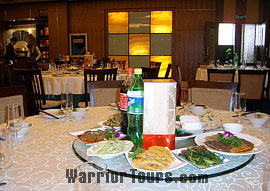Alcohol Classification & Drinking Game
![]() Alcohol Classification
Alcohol Classification
Alcohol always accompanies delicious dishes either when people first meet or when old friends have a reunion. China produces liquor, beer, wine, yellow wine, and fruit wine. However China mainly produces liquors distilled. The most famous Chinese liquor is Maotai, a 55-percent spirit made of wheat and sorghum that, for centuries, has been produced in Maotai Town, Guizhou province. Besides, Wuliangye and Erguotou are also popular among people.
 In ancient times, wine seldom dominated, although there are evidences suggesting it had a long history. Wine and its brewing technology were once introduced from the neighboring regions in the Han, Tang and Yuan dynasties. During the Tang dynasty, wine was popular and was highly praised by many famous poets. It was served as the designated offerings for the Royal Ancestral Temple during the Yuan dynasty, since the ruler was addicted to it.
In ancient times, wine seldom dominated, although there are evidences suggesting it had a long history. Wine and its brewing technology were once introduced from the neighboring regions in the Han, Tang and Yuan dynasties. During the Tang dynasty, wine was popular and was highly praised by many famous poets. It was served as the designated offerings for the Royal Ancestral Temple during the Yuan dynasty, since the ruler was addicted to it.
The amber colored yellow wine is unique product of China and is deemed as one of the three ancient alcoholic beverages in the world.
Alcoholic beverage like today's beer called li, was produced long ago, very little although. When maiden were to become adults, they would drink li to celebrate the time.
![]() Drinking Game (Jiuling)
Drinking Game (Jiuling)
At the very beginning, alcohol was mainly a beverage in the ceremonial rites. The drinking games, Jiuling called in Chinese, were just aids for drinking. Certainly there were other aids for drinking, such as archery, chess playing and arrow pitching. Aimed to restrict overdrinking to keep drinkers be gentlemen and preserve courtesy of the time, there were even special designated officials to manage these aids for drinking. Later, drinking games which added entertainment to rites, gradually became artifice to persuade, wager and force overdrinking. Jiuling is a unique part of Chinese culture.

Now Jiuling has many forms, depending on the drinker's social status, literacy status and interests, which can be classified into three categories - general game, contest game and literal game.
General game includes those games every body can play, such as joke telling, riddling and Chuanhua (passing flowers one by one). This category usually appears on banquet for ladies.
Contest game consists of archery, arrow pitching, chess playing, dicing, finger guessing and animal betting. Among these, the latter two are common.
In finger guessing, two players stretch out their right hands, with several fingers sticking out while the others closing to their palm and at the same time, each of them, usually roars a number from nil to ten. If fingers sticking out adds up and the sum equals to a player's number, then he wins and the loser will have to drink. There are many differences in different regions.
Animal betting is a very interesting game every Chinese can play. In the game, one uses his Chopstick to tap the other player's chopstick and at the same time speaks out one of four terms. The other does the same. There are four terms: stick, tiger, cock and insect. The regulations are simple: Stick beats tiger; tiger eats cock; cock pecks insect; insect bores stick.
Literal game is mainly popular in bookworms since they receive good education and have refined knowledge and know the essence of Chinese traditional culture. Intellectuals sometimes play the other two category drinking games too, however they consider those games vulgar. Beaux-esprit and cultured ladies prefer the elegant game, literal game.
Usually literal game is unique and artful literal contest, which requires superior wisdom, broad knowledge sphere and fast response. In order to animate atmosphere, players will do their best to produce original, novel, unpredicted and extremely fine literal pieces improvitori, with quotations from scriptures, history, poems, proverbs, and fairy tales embedded. Many Jiulings of this category, very artistic, are pleasingly worthy of literary appreciation. Bai Juyi, one of Chinese greatest poets, even thought elegant Jiuling was much more interesting than music accompaniment.

